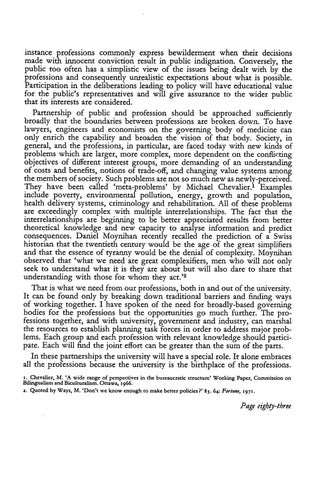instance professions commonly express bewilderment when their decisions made with innocent conviction result in public indignation. Conversely, the public too often has a simplistic view of the issues being dealt with by the professions and consequently unrealistic expectations about what is possible. Participation in the deliberations leading to policy will have educational value for the public's representatives and will give assurance to the wider public that its interests are considered. Partnership of public and profession should be approached sufficiently broadly that the boundaries between professions are broken down. To have lawyers, engineers and economists on the governing body of medicine can only enrich the capability and broaden the vision of that body. Society, in general, and the professions, in particular, are faced today with new kinds of problems which are larger, more complex, more dependent on the conflicting objectives of different interest groups, more demanding of an understanding of costs and benefits, notions of trade-off, and changing value systems among the members of society. Such problems are not so much new as newly-perceived. They have been called 'meta-problems' by Michael Chevalier.' Examples include poverty, environmental pollution, energy, growth and population, health delivery systems, criminology and rehabilitation. All of these problems are exceedingly complex with multiple interrelationships. The fact that the interrelationships are beginning to be better appreciated results from better theoretical knowledge and new capacity to analyse information and predict consequences. Daniel Moynihan recently recalled the prediction of a Swiss historian that the twentieth century would be the age of the great simplifiers and that the essence of tyranny would be the denial of complexity. Moynihan observed that 'what we need are great complexifiers, men who will not only seek to understand what it is they are about but will also dare to share that understanding with those for whom they act.12 That is what we need from our professions, both in and out of the university. It can be found only by breaking down traditional barriers and finding ways of working together. I have spoken of the need for broadly-based governing bodies for the professions but the opportunities go much further. The professions together, and with university, government and industry, can marshal the resources to establish planning task forces in order to address major problems. Each group and each profession with relevant knowledge should participate. Each will find the joint effort can be greater than the sum of the parts. In these partnerships the university will have a special role. It alone embraces all the professions because the university is the birthplace of the professions. Ch li ,M. 'A wide range of perspectives in the bureaucratic structure' Working Paper, Commission on Bilingualism and Biculturalism. Ottawa, 5966. 2. Quoted by Ways, M. 'Don't we know enough to make better policies?' 83. 64: Fortune, 1971. .
eva
er
Page eigbty-three






